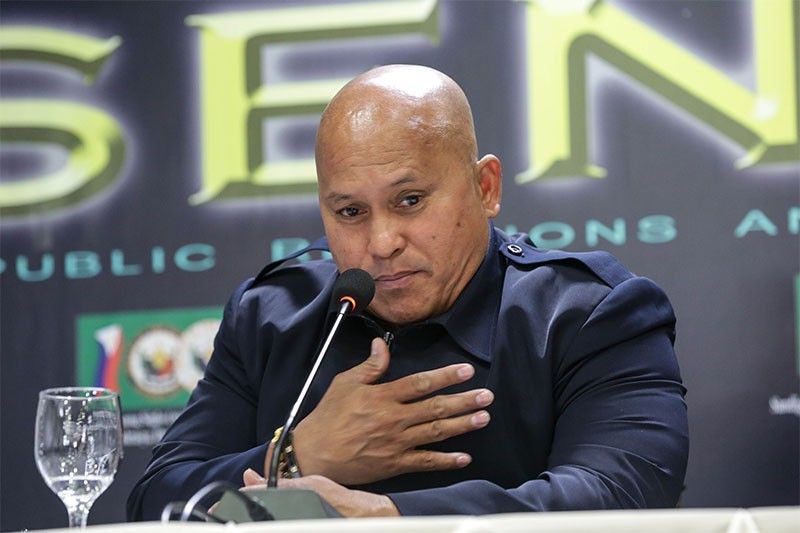Dela Rosa’s bid to junk, return impeach articles sets ‘bad precedent’

MANILA, Philippines — Sen. Bato dela Rosa moved to dismiss the impeachment proceedings of Vice President Sara Duterte, a mechanism that cannot be found in the Constitution or the Senate’s rules.
For House prosecution spokesperson Antonio Bucoy, entertaining such a motion and hiding it in the guise of a “remand” order — which is also absent in the Senate rules — only sets a bad precedent for future impeachments.
“It’s a bad precedent. It’s a terrible precedent dahil hindi ito alinsunod sa Saligang Batas,” he said at a press conference on Tuesday, June 17.
(It’s a bad precedent. It’s a terrible precedent because it does not follow the Constitution.)
“Wala po sa Saligang Batas ‘yan. ‘Yan ho ay betrayal. ‘Yan ho ay hindi alinsunod sa ating Saligang Batas,” Bucoy added.
(That is not in the Constitution. That is betrayal. That is not in accordance with our Constitution.)
Who can issue motions?
Bucoy stressed that senator-judges do not issue motions; only the parties involved, like the prosecution panel and the defense, may do so.
“I’m assuming ang tinutukoy ay ang motion to dismiss na inilahad ni Sen. Bato Dela Rosa. Ang hukom po ay hindi nagmo-motion. Ang nagmo-motion ‘yung mga partido,” he said.
(I’m assuming the reference is the motion to dismiss raised by Sen. Bato Dela Rosa. The judge does not make a motion. The parties make the motion.)
Dela Rosa was one of the Duterte bloc senators who drafted a resolution seeking a “de facto dismissal” of the impeachment. It was Sen. Robin Padilla who filed it a day before the Senate convened as an impeachment court.
Opposed to seeing the evidence and holding the trial, Dela Rosa attempted to dismiss the impeachment altogether before the court convened. He, however, failed when Sen. Joel Villanueva said the Senate does not have the jurisdiction to attend to such motions as a legislative body.
Dela Rosa raised alleged “constitutional infirmities” in the impeachment complaint, also contending that the 19th Congress does not have enough time to proceed to trial and that it could not continue in the 20th Congress.
“‘Yung mga grounds na binanggit ni Senator Dela Rosa, ‘yun din po ‘yung grounds na iniakyat nila sa Supreme Court,” Bucoy said. “So ang nangyari, si Sen. Dela Rosa umaaksyon na parang defense counsel.”
(The grounds mentioned by Senator Dela Rosa are also the grounds they raised in the Supreme Court. So what happened was, Sen. Dela Rosa acted like defense counsel.)
RELATED: Sara Duterte asks Supreme Court to stop impeachment
Try and decide, not hear and decide
Bucoy maintained that the impeachment court must try and decide on impeachment cases based on evidence. Nowhere in the Constitution or Senate rules does it say it can be dismissed before holding a trial.
“Ayon sa Saligang Batas, kapag nailatag ang articles of impeachment, dapat agad-agad mag-proceed sa trial,” he said.
(According to the Constitution, once articles of impeachment are filed, the trial must proceed immediately.)
Once the articles of impeachment are transmitted and presented, the spokesperson said the Senate should issue a writ of summons to the defendant-respondent to give them the chance to respond to the allegations.
“Ang ginamit ng Saligang Batas na lenggwahe, trial shall forthwith proceed. Hindi sinabi ng Saligang Batas na ang kapangyarihan ay to hear and decide,” Bucoy added.
(The language used by the Constitution is, trial shall forthwith proceed. The Constitution does not say that the power is to hear and decide.)
The Constitution, for him, is specific enough to use the word “try and decide” instead of “hear and decide,” in which the latter has more room for interpretation.
“In other words, may basehan ba ‘yung sakdal? Hindi sinabi ng Saligang Batas to hear, ang sinabi ng batas to try and decide. Ganoon ka-eksakto ang lenggwahe ng Saligang Batas ukol sa proseso ng impeachment,” Bucoy said.
(In other words, is there a basis for the impeachment? The Constitution did not say to hear, the law said to try and decide. That is how exact the language of the Constitution is on the process of the impeachment.)
On the 'confusing' order
The prosecution panel is seeking clarification regarding the Senate’s order requiring the House of Representatives to certify the non-violation of the articles of impeachment, as well as for the 20th Congress to inform the impeachment court if they are still willing to pursue the impeachment.
Bucoy, however, believes the Senate has no power to return the articles of impeachment as there is already a “presumption of legality and regularity” once transmitted.
If it seeks clarification, it can also do without returning it, which House prosecutors said is the reason why they hope the impeachment court could provide a clearer explanation of the order.
- Latest
- Trending































